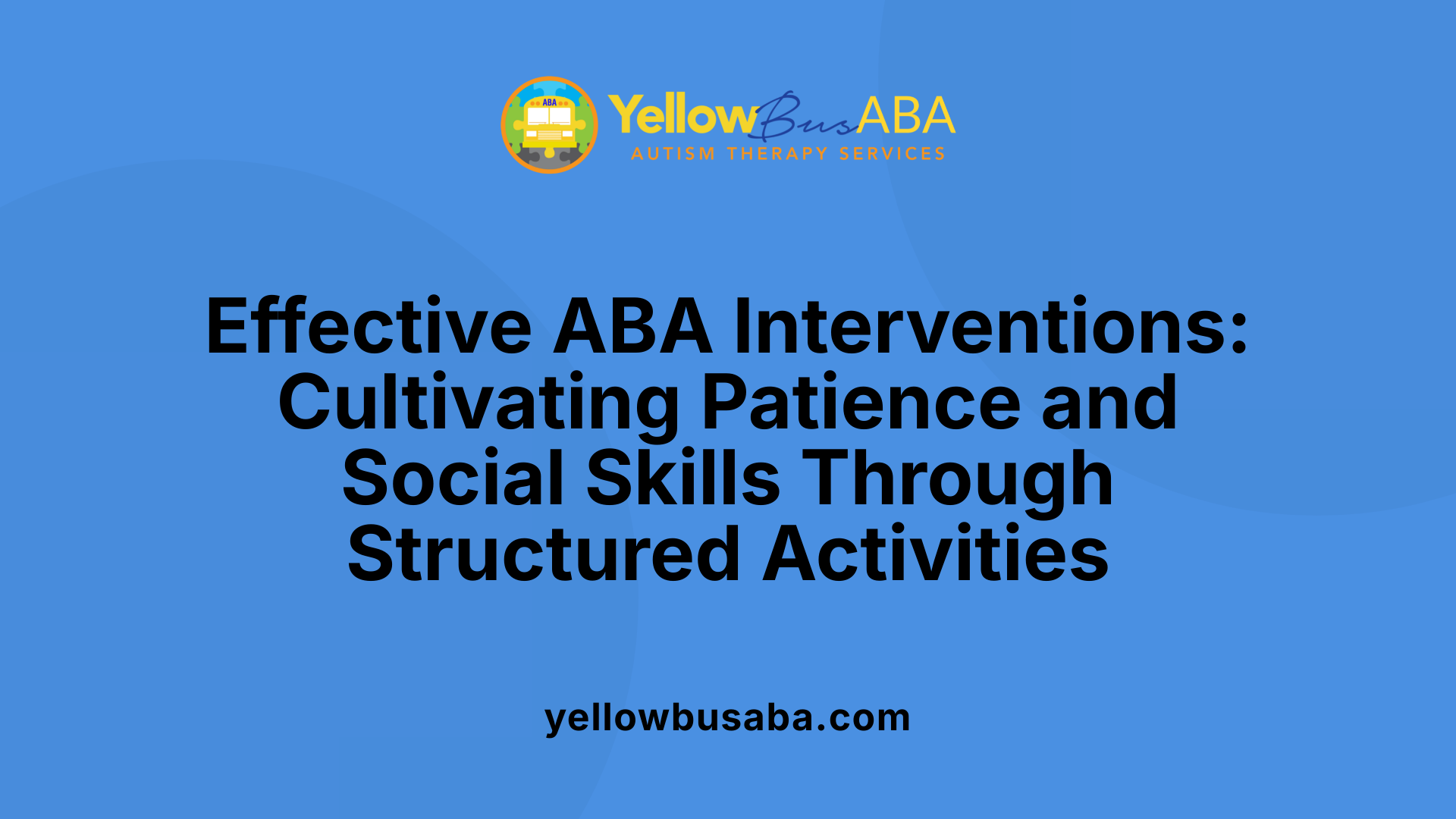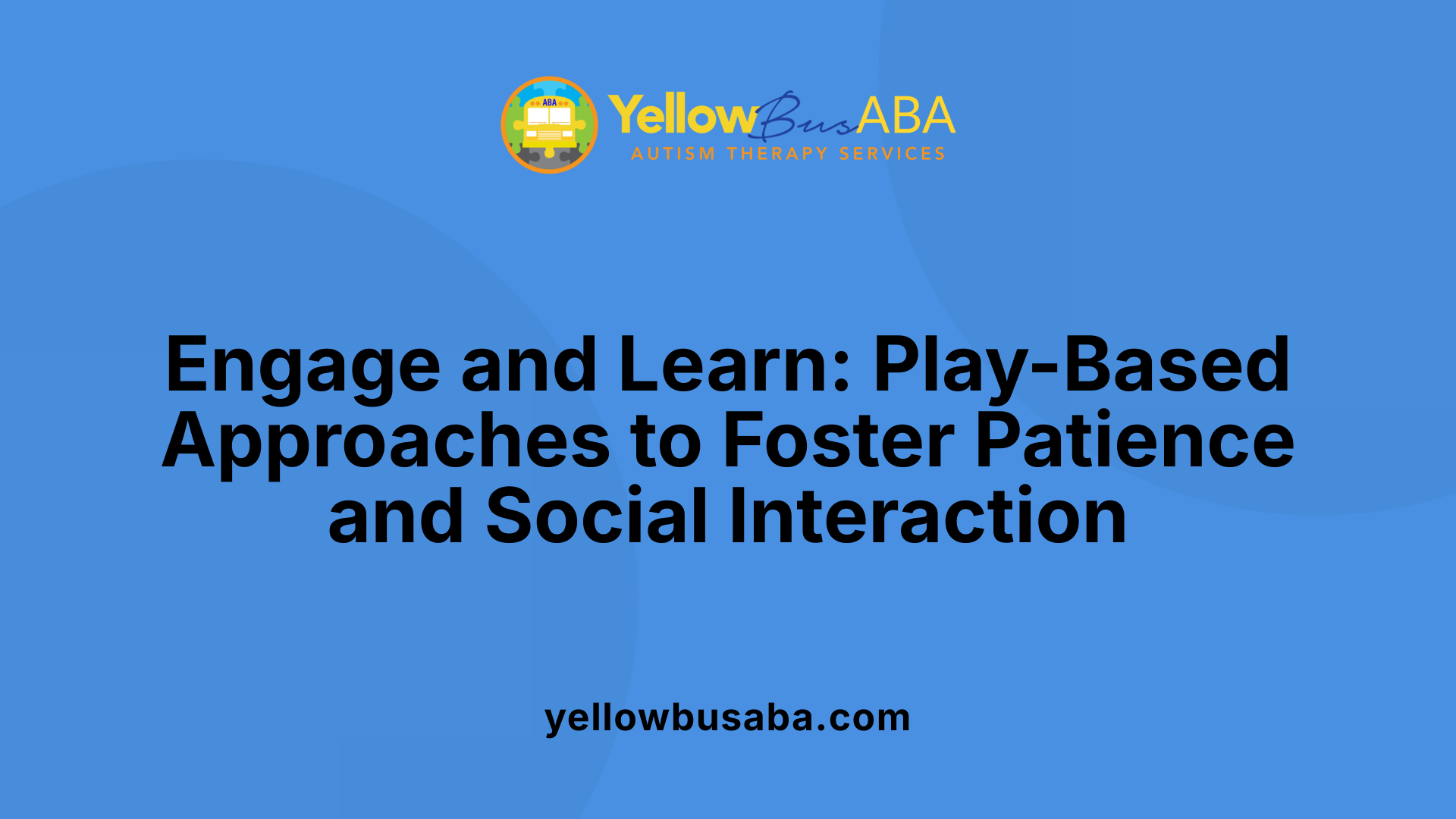Understanding How Behavioral Interventions Foster Patience in Children
ABA therapy is a highly structured intervention supported by robust evidence for its effectiveness in helping children, particularly those with autism spectrum disorder (ASD), develop essential social skills, including patience. By focusing on individual needs and employing a variety of evidence-based techniques, ABA therapy systematically enhances children's ability to participate confidently in group activities, take turns, and share, which are crucial skills for social integration. This article explores the methods, interventions, and strategies used within ABA to cultivate patience, how play-based and social skills training contribute to this development, and the role of peer and group engagement in fostering lasting behavioral improvements.
Core Components of ABA Therapy for Social and Patience Development

How does ABA therapy help children develop patience in group settings?
ABA therapy supports children in developing patience through a variety of structured techniques tailored to their needs. One fundamental approach involves teaching impulse control and emotional regulation—essential skills for participating in group activities.
Behavioral strategies begin with positive reinforcement, which encourages children to repeat desired behaviors, such as waiting their turn. Visual supports like timers and schedules are employed to help children understand the concept of waiting and transitions. For example, timers give a clear visual cue for how long they need to wait, reducing anxiety and frustration.
Engaging activities like waiting games, role-playing scenarios, and social stories also play a vital role. These activities make the concept of patience fun and less intimidating, providing children with practical ways to practice waiting and turn-taking.
Additionally, ABA therapists often incorporate routines that reinforce patience during daily activities. Over time, these personalized strategies help children learn to manage their emotions, cooperate with peers, and adjust more smoothly to routines and transitions. The goal is a gradual buildup of patience, enabling children to participate confidently in social, educational, and recreational group settings.
Interventions That Cultivate Social Skills and Patience

What interventions in ABA therapy foster social skills and patience in children?
ABA therapy includes several structured activities designed to improve social skills and develop patience. A central component is the use of social stories and scripts, which are simple, illustrated narratives that teach children about social expectations, appropriate responses, and emotional understanding in various situations. These tools help children navigate social interactions confidently and predictably.
Role-playing scenarios are also vital. They give children a chance to practice greeting others, taking turns, sharing, and resolving conflicts in a safe environment. Peer modeling, where children observe and imitate appropriate behaviors, enhances learning and encourages patience.
Social skills groups, such as Kids Club operated by Circle Care Services, organize fun activities that promote social interaction. These groups focus on essential skills like sharing, understanding emotions, and problem-solving, reinforcing patience through repetition and positive feedback.
Visual supports like timers and social scripts contribute to better self-regulation. Timers give warning before transitions, helping children prepare mentally and reduce frustration. Visual aids like emotion cards teach children to recognize and respond to feelings, fostering emotional regulation.
Activities such as turn-taking games are designed explicitly to teach patience and respect for others' turns. Group activities and community outings provide real-life practice, encouraging children to apply what they learn in everyday settings.
Parental involvement and collaboration with teachers and therapists are crucial. Training caregivers to use these strategies consistently across environments ensures that children develop patience and social skills in a uniform and supportive manner.
In summary, ABA uses a combination of visual tools, social stories, role-playing, and structured group activities with positive reinforcement to help children build social competence and patience gradually and effectively.
What are common approaches in ABA therapy for enhancing social development and patience?
ABA therapy employs various approaches to enhance social skills and patience among children with autism. Social stories and scripts are fundamental, as they prepare children for social situations by providing clear, understandable cues. Visual supports like emotion recognition cards and timers help children understand social cues and manage their behaviors.
Role-playing and peer modeling allow children to practice social interactions in a controlled setting. These methods develop empathy, communication, and patience as children observe and imitate appropriate responses.
Structured social skills groups and community outings offer opportunities to apply skills in real-life contexts. These activities promote patience through routines, turn-taking, and collaborative play.
Reinforcement strategies are tailored to encourage perseverance and patience. Positive reinforcement, such as praise or rewards for waiting or sharing, solidifies these behaviors.
Foundational skills such as imitation, joint attention, and emotion recognition are taught to lay the groundwork for improved social understanding. These skills support children in interacting more effectively with peers and adults.
Parental involvement ensures consistency and generalization of these skills at home and in various settings. Customizing intervention plans based on individual needs guarantees that strategies are effective and meaningful.
Overall, ABA’s systematic use of visual aids, role-play, peer interaction, and reinforcement creates an environment where children can develop patience and social competence steadily and meaningfully.
Play-Based Methods Supporting Patience and Social Skills

How do play-based methods in ABA therapy support patience and social interaction?
Play-based methods in ABA therapy play a vital role in fostering patience and social skills among children with autism spectrum disorder. These approaches engage children in structured, enjoyable activities that naturally require turn-taking, sharing, and waiting. Such activities include social games, pretend play, and role-playing scenarios that mimic real-life social interactions. These methods help children practice patience by encouraging them to wait their turn and manage expectations in a low-pressure environment.
Positive reinforcement is integral during play, motivating children to repeat socially appropriate behaviors. Rewards such as praise or access to preferred items reinforce cooperation and patience, making the learning process engaging and sustainable. Visual aids and transition strategies embedded within play activities further support children in understanding what comes next, reducing frustration and promoting self-regulation.
Incorporating play into ABA creates a motivating environment where children can freely practice and generalize social interactions. Overall, structured play provides a natural setting to develop patience, understanding, and social communication skills, which are essential for functioning effectively in daily social settings.
How does ABA therapy support group participation and peer engagement?
ABA therapy enhances group participation and peer engagement by systematically teaching core social skills such as sharing, cooperation, and initiating interactions. This is achieved through a combination of role-playing, modeling, and positive reinforcement techniques tailored to each child's developmental level and goals.
Structured social skill programs often involve small groups or peer-mediated interventions where neurotypical peers are trained to support inclusive play and communication. Such involvement helps children with autism practice social skills in genuine contexts, fostering meaningful peer relationships and reducing feelings of social isolation.
Additionally, ABA-trained therapists and educators use targeted coaching to encourage active participation in group activities, including playground games, classroom routines, and community outings. These efforts are supported by environmental modifications and visual supports, like schedules or social stories, to prepare children for transitions and group interactions.
Although improvements in peer engagement are promising, ongoing support and reinforcement are often necessary to sustain these skills. Overall, ABA’s structured approach, combined with peer involvement and environmental adaptations, promotes active, inclusive participation, helping children build friendships and social confidence.
Evidence for Effectiveness of ABA in Promoting Patience in Groups

Is there evidence supporting the effectiveness of ABA strategies in promoting patience within group settings?
Yes, there is growing and substantial evidence that ABA therapy strategies are effective in fostering patience among children, especially those with autism. Research studies have demonstrated that specific ABA techniques such as positive reinforcement, visual supports like timers and social stories, and structured routines can significantly improve a child's ability to wait, take turns, and remain calm in social and group contexts.
Structured ABA sessions often incorporate visual cues—such as timers with countdowns—to prepare children for transitions, reducing frustration and tantrums. These visual aids help children understand what to expect and develop patience as they move from one activity to the next.
Research findings suggest that when ABA interventions are tailored to individual needs, they can enhance social interactions and emotional regulation. For example, role-playing scenarios and social skills groups teach children how to manage their emotions, communicate appropriately, and behave patiently in group situations.
Several studies indicate that children in ABA programs who are exposed to consistent reinforcement of patience-related behaviors show noticeable improvements over time. Reinforcing behaviors such as waiting calmly or sharing without conflict encourages children to repeat these actions.
Furthermore, expert reviews highlight that integrating visual supports—like social stories that explain social expectations—and behavioral strategies—such as leadership modeling by adults—are particularly effective in teaching children how to behave patiently within group settings.
Longitudinal data from large-scale studies reinforce that early ABA interventions can lead to sustained improvements in patience, social cooperation, and overall adaptive functioning. These skills lay a foundation for successful integration into school and community environments.
In conclusion, the evidence from diverse research indicates that ABA's evidence-based strategies are highly effective in promoting patience. Employing techniques like positive reinforcement, visual timers, social stories, and role play helps children develop important social skills and navigate group interactions with greater ease and confidence.
Benefits and Broader Impact of ABA Therapy on Social Growth

What benefits does ABA therapy have for developing social skills and patience in children?
Applied Behavior Analysis (ABA) therapy plays a vital role in helping children with autism develop essential social skills and patience. Through structured programs that emphasize positive reinforcement, children learn to communicate more effectively, often improving eye contact, vocabulary, and understanding social cues.
Social interactions such as sharing, taking turns, greeting others, and engaging in conversations are explicitly taught using role-playing, social stories, and group activities. These methods help children interpret social cues, understand body language, and respond appropriately. As a result, children become more confident in social settings, forming friendships and participating in group activities.
Patience is fostered through techniques like turn-taking games, timers, visual cues such as 'first/then' statements, and routines that gradually increase in complexity. By practicing these skills repeatedly, children learn to manage their impulses and emotions better, resulting in increased persistence in tasks and reduced frustration.
The tailored nature of ABA ensures that each child's unique needs are addressed. Progress is monitored regularly, and interventions adapt as skills develop. This personalized approach leads to significant, long-lasting improvements.
Long-term, children who undergo ABA therapy tend to perform better academically, develop meaningful peer relationships, and gain greater independence. These skills not only benefit them socially but also bolster their self-confidence.
Families gain additional advantages, experiencing less daily frustration and more positive interactions with their children. Overall, ABA therapy sets the foundation for children to thrive in their social and emotional lives, paving the way for future success.
What hand-in-hand strategies support social skills and patience?
Several supplementary strategies enhance the social and patience-building effects of ABA. Using social stories teaches children appropriate responses to various social situations. Role-playing scenarios simulate real-life interactions, helping children practice greetings, sharing, and conflict resolution. Turn-taking games and joint attention activities foster patience and cooperation. Emotion recognition activities improve awareness of others’ feelings, promoting empathy. Community outings provide real-world experiences to apply skills, while peer playdates foster friendship and social competence. Visual supports, timers, and social apps reinforce learning and help children anticipate transitions. Remaining calm as an adult models patience, supporting children during difficult moments. Play-based interventions serve as engaging, natural contexts for practicing social skills, boosting communication and problem-solving abilities. Collaborating with families and educators ensures consistent application of strategies, maximizing progress.
How does ABA therapy lay a foundation for future success?
By focusing on developing independence and self-help skills—like dressing, feeding, and following routines—ABA therapy equips children with the tools necessary for daily life.
Building these foundational skills early benefits children academically, socially, and emotionally, reducing reliance on intensive support later. MTLong-term, these children are more likely to succeed in school, form lasting friendships, and participate confidently in community activities.
Progress in cognitive areas—such as problem-solving, memory, and flexibility—further strengthens their resilience and adaptability. The therapy’s emphasis on personalized, goal-oriented plans ensures that every child’s potential is nurtured systematically, setting the stage for sustained growth and independence.
In summary, ABA therapy not only enhances immediate social and behavioral skills but also establishes a resilient groundwork for lifelong success.
Fostering Lasting Patience and Social Skills in Children with ABA
ABA therapy employs a comprehensive array of strategies, interventions, and techniques designed to promote patience and social development in children. By integrating social stories, visual supports, role-playing, and play-based activities, ABA sessions create a positive and motivating environment that teaches children how to wait, share, and take turns. These methods are complemented by peer interactions, community outings, and caregiver involvement, which help generalize skills across settings. Evidence supports the effectiveness of ABA in reducing problem behaviors and improving children’s capacity to participate in group settings confidently. The gradual building of social skills, emotion regulation, and patience through personalized, evidence-based interventions ensures children are better equipped to thrive socially, academically, and emotionally. This holistic approach not only supports their immediate needs but also lays a strong foundation for their future growth and success.
References
- Social Skills Training and Therapy for Autism - Circle Care Services
- ABA Therapy at Home | Social Skills Activities for Children ADS
- Tips that improved my autistic child's behavior | Autism Speaks
- How ABA Therapy Supports Child Development
- Therapeutic Approaches for Boosting Motor Skills in Children
- Building Patience in Children with Autism - PediaPlex
- Play-based interventions to support social and communication ...
- How ABA Therapy Can Help In School
- ABA Therapy and Play Skills: Building Foundations for Success
- Benefits of ABA Therapy for Children with Autism





.jpg)
